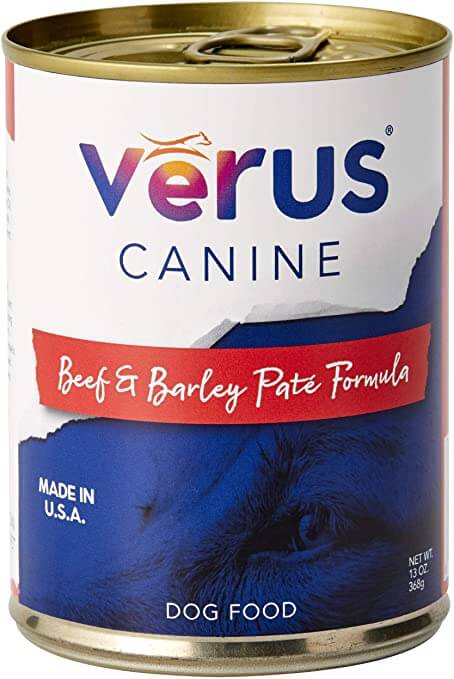
DogFoodAdvisor is reader supported See how
All reviews are 100% impartial but if you buy using links on this page, we may earn a referral fee.
Our Verdict
VeRUS canned product range is made up of six recipes which each receive the Dog Food Advisor’s rating, 4 stars.
The table below shows each recipe in this range including our rating and the AAFCO nutrient profile: Growth (puppy), Maintenance (adult), All Life Stages, Supplemental or Unspecified.
| Product line | Rating | AAFCO |
|---|---|---|
| VeRUS Duck and Potato Pate | 4 | U |
| VeRUS Beef and Barley Pate | 4 | U |
| VeRUS Turkey and Veggie Pate | 4 | U |
| VeRUS Lamb and Rice Pate | 4 | U |
| VeRUS Fish and Potato Pate | 4 | U |
| VeRUS Chicken and Rice Pate | 4 | U |
Recipe and Label Analysis
VeRUS Beef and Barley Pate was selected to represent the other products in the line for detailed recipe and nutrient analysis.
VeRUS Beef and Barley Pate
Estimated Dry Matter Nutrient Content
Protein
Fat
CarbsCarbohydrates
Beef, beef broth, beef liver, pearled barley, brown rice, dicalcium phosphate, agar-agar, salmon oil, flaxseed meal, salt, choline chloride, potassium chloride, taurine, dried kelp, zinc proteinate, iron proteinate, copper proteinate, sodium selenite, manganese proteinate, organic sunflower oil, ethylenediamine dihydriodide, calcium carbonate, vitamin E supplement, thiamine mononitrate, niacin supplement, d-calcium pantothenate, biotin, vitamin A supplement, riboflavin supplement, vitamin D3 supplement, vitamin B12 supplement, pyridoxine hydrochloride, folic acid
Fiber (estimated dry matter content) = 2%
Red denotes any controversial items
| Estimated Nutrient Content | |||
|---|---|---|---|
| Method | Protein | Fat | Carbs |
| Guaranteed Analysis | 8% | 5% | NA |
| Dry Matter Basis | 36% | 23% | 33% |
| Calorie Weighted Basis | 29% | 44% | 26% |
Ingredients Analysis
The first ingredient in this dog food is beef. Beef is defined as “the clean flesh derived from slaughtered cattle” and includes skeletal muscle or the muscle tissues of the tongue, diaphragm, heart or esophagus.1
Beef is naturally rich in all ten essential amino acids required by a dog to sustain life.
The second ingredient is beef broth. Broths are of only modest nutritional value. Yet because they add both flavor and moisture to a dog food, they are a common addition component in many canned products.
The third item is beef liver, an organ meat sourced from a named animal and thus considered a beneficial component.
Next, we find barley, a starchy carbohydrate supplying fiber and other healthy nutrients. However, aside from its energy content, this cereal grain is of only modest nutritional value to a dog.
The fifth ingredient is brown rice, a complex carbohydrate that (once cooked) can be fairly easy to digest. However, aside from its natural energy content, rice is of only modest nutritional value to a dog.
The sixth item is dicalcium phosphate, likely used here as a dietary calcium supplement.
The next ingredient is agar agar, a natural vegetable gelatin derived from the cell walls of certain species of red algae. Agar is rich in fiber and is used in wet pet foods as a gelling agent.
From here, the list goes on to include numerous other ingredients.
But realistically, ingredients located this far down the list (other than nutritional supplements) are not likely to affect the overall rating of this VeRUS product.
With six notable exceptions…
First, salmon oil is naturally rich in the prized EPA and DHA type of omega-3 fatty acids. These two high quality fats boast the highest bio-availability to dogs and humans.
Depending on its level of freshness and purity, salmon oil should be considered a commendable addition.
Next, we note the inclusion of flaxseed meal, one of the best plant-based sources of healthy omega-3 fatty acids. Flax meal is particularly rich in soluble fiber.
However, flaxseed contains about 19% protein, a factor that must be considered when judging the actual meat content of this dog food.
We also find taurine in this recipe. Taurine is an important amino acid associated with the healthy function of heart muscle. Although taurine is not typically considered essential in canines, some dogs have been shown to be deficient in this critical nutrient.
In addition, this recipe contains sodium selenite, a controversial form of the mineral selenium. Sodium selenite appears to be nutritionally inferior to the more natural source of selenium found in selenium yeast.
This food also has sunflower oil, which is nutritionally similar to safflower oil. Since these oils are high in omega-6 fatty acids and contain no omega-3’s, they’re considered less nutritious than canola or flaxseed oils.
Sunflower oil is notable for its resistance to heat damage during cooking.
There are several different types of sunflower oil, some better than others. Without knowing more, it’s impossible to judge the quality of this ingredient.
And lastly, this product includes chelated minerals, minerals that have been chemically attached to protein. This makes them easier to absorb. Chelated minerals are usually found in better dog foods.
Nutrient Analysis
Based on its ingredients alone, VeRUS canned dog food looks like an above-average wet product.
The dashboard displays a dry matter protein reading of 36%, a fat level of 23% and estimated carbohydrates of about 33%.
As a group, the brand features an average protein content of 36% and a mean fat level of 23%. Together, these figures suggest a carbohydrate content of 33% for the overall product line.
And a fat-to-protein ratio of about 63%.
Which means this product line contains…
Near-average protein. Near-average fat. And above-average carbs when being compared to a typical wet dog food.
Even when you take into consideration the protein-boosting effect of the flaxseed meal, this looks like the profile of a canned formula containing a moderate amount of meat.
VeRUS Dog Food Recall History
The following automated list (if present) includes all dog food recalls related to VeRUS through July 2024.
No recalls noted.
You can view a complete list of all dog food recalls since 2009 here.
Our Rating of VeRUS Dog Food
VeRUS is a grain-inclusive canned dog food using a moderate amount of named meats as its dominant source of animal protein, thus earning the brand 4 stars.
Compare VeRUS Dog Food
How does VeRUS compare with The Dog Food Advisor's most recommended brands?
A Final Word
The Dog Food Advisor does not accept money, gifts, samples or other incentives in exchange for special consideration in preparing our reviews.
However, we do receive a referral fee from online retailers (like Chewy or Amazon) and from sellers of perishable pet food when readers click over to their websites from ours. This helps cover the cost of operation of our free blog. Thanks for your support.
For more information, please visit our Disclaimer and Disclosure page.








